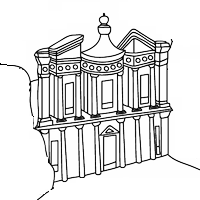Zadir-ud-din Muhammad Babur was born on February 14, 1483. In 1494 he succeeded his father at the head of the small kingdom of Farghana in Turkestan. He quickly decided to extend his territories towards the east. In 1504 he attacked Afghanistan and captured Kabul. Babur then sees the potential of India in proximity in terms of wealth. He launched two waves of invasion, one in 1523 and the other in 1525. In the latter, and with only 12,000 men, he inflicted a decisive defeat on the troops of Ibrahim Lodhi, Sultan of Delhi.

This battle took place at Panipat, April 21, 1526, and ended with the death of Ibrahim Lodhi. Babur then proceeds to Delhi and Agra. He proclaimed himself sultan, marking the beginning of the Mughal era.
In the following year, his power was threatened by the Rajput states, which allied themselves for the occasion in order to face this new enemy. The Rajput troops, led by Rana Sanga and supported by the Lodhi heirs, form a considerable force. Hostilities began on 16 March 1527 in Khanwah near Agra. Though in sub-number, the Mughals reject the Rajputs thanks to the great tactical sense of Babur and a terribly effective artillery. This victory ensures total control of Babur on the north of India.
Babur had the intelligence to leave the quasi-sovereignty of the great regions he controlled to competent ministers. The chronicles of his life, the Babarnama, were widely diffused and read in his kingdom.
When he died on December 30, 1530, the Mughal empire he leaves extends from his Turkestan of origin to the east of India passing through Afghanistan, Punjab and Delhi.

His son Humayun inherits the throne.
See also:



















